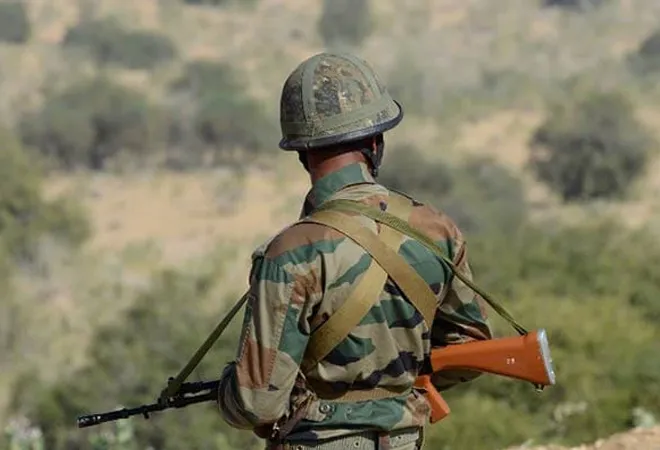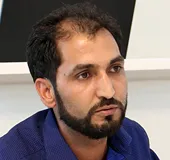
With Pakistan using narco-terrorism as a new weapon in its proxy war against India, the Kashmir Valley has seen a
2,000 percent rise in heroin abuse in the last five years. While referring to the menace which is directly targeting the youth and channelling finance for Pakistan-backed terror activities, Jammu and Kashmir police chief
Dilbag Singh dubbed the narco-terrorism from Pakistan as "the biggest challenge". The strengthened security grid and increased coordination among various security agencies has effectively lowered the scale of terrorism activities. Curbing the drug menace, however, is difficult, as Pakistan has now resorted to infiltrating large amounts of narcotics in Kashmir with the help of drones.
Narco-Terrorism in Kashmir
The centuries-old cultural and religious synthesis of Pandits and Muslims shaped the sociocultural and socioeconomic fabric of the Kashmiri society. This unique socioreligious confluence gave birth to the distinctive syncretic, devotional, and philosophical 'Kashmiri' way of life. It created an 'informal social control system' that played a dominant role and exerted great control over the individuals. However, the growing influence of radicalisation, terrorism, and conflict "implemented" from across the border since 1989 has eroded this composite way of life, ripped the societal fabric and mores, and weakened the centuries-old system. Furthermore, repeated calls for strikes by separatists and militants, long-term curfews imposed by the security agencies, and the unending conflict have increased anxiety, depression, boredom, and psychological stress. In addition to this, the near-total lack of recreational activities has lured the impressionable young minds of Jammu and Kashmir to the perils of drug addiction.
The strengthened security grid and increased coordination among various security agencies has effectively lowered the scale of terrorism activities.
The Valley has witnessed an alarming rise in drug addiction in all socioeconomic classes of the region. Every hour, a new drug addict unfailingly enters the drug de-addiction centre in Kashmir. Srinagar's Government Medical College's Oral Substitution Therapy Centre
reported only 489 cases in 2016, but breached the 10,000 mark in 2021. This alarming 2,000 percent spike in the last five years has sent shockwaves across the security apparatus and the government of Jammu and Kashmir.
Srinagar and Anantnag districts of Kashmir Valley witness more than INR 3.7 crores being spent daily on drugs. Shopian and Pulwama districts have also shown the same trend for the last two years. They have also reported many deaths due to drug overdose. According to a survey by the
Ministry of Social Justice and Empowerment and All India Institute of Medical Sciences in 2019, more than 4.5 percent of the total population use drugs.
Of late, Pakistan has used a dual strategy of sending drugs as well as weapons to keep the conflict alive and tear the core of the valley's social fabric. Heroin smuggled from Pakistan is the most widely used opioid all over Kashmir. The cross-border smuggling of narcotics provides oxygen to terrorism via finances and, if not curbed soon, could ruin the lives of the region's youth. The finances generated from drugs such as heroin fund separatists' activities and spread other centrifugal tendencies. Increasingly, terror modules that have been busted in the recent past by security agencies show a more significant challenge to society and security. In June last year, a narco-terror module busted in the Baramulla district resulted in the arrests of ten people possessing heroin worth
INR 45 crores along with Chinese grenades and four pistols. This terror module was operating in the whole of Jammu and Kashmir as well as outside the Union Territory.
The cross-border smuggling of narcotics provides oxygen to terrorism via finances and, if not curbed soon, could ruin the lives of the region's youth.
Mum Mullahs Worsening the Situation
Besides increased vigil by the security forces, the government of Jammu and Kashmir has responded to the unprecedented rise in drug abuse by setting up
ten drug de-addiction centres, including two large facilities in Srinagar and Jammu. It has also established a counselling centre in each district, with qualified doctors and counsellors. The administration and security agency also organise seminars, workshops, and public lectures to spread awareness. Surprisingly, however, the total silence of the religious leaders on this dreadful situation has revealed how the land's unique 'informal social control system' has been crippled.
For the last 30 years, Pakistan has succeeded in breaking down the traditional methods of informal control system by introducing contesting religious ideologies such as
Jamat-i-Islami, Salafism, and
Tableeg. These contesting ideologies have silenced the sane voices within society, making traditional social mores and identities irrelevant. Subsequently, people’s affiliation with these ideologies has divided society at the community level, fuelling increased deviant behaviour among the youth. This unchecked deviant behaviour has been primarily responsible for the widespread rise in radicalism, extremism, and now drug abuse.
Rather than seriously discussing drug abuse and the role of Pakistan during such religious gatherings, the mullahs and religious leaders have stuck to their own teachings rather than the Quranic teachings and prophetic sayings against drug abuse.
The mullahs affiliated with these contesting ideologies deliver sermons on Fridays and festive days in mosques. While they remain deeply invoked to their doctrines and their discourses are taken very seriously, they have never spoken against drug abuse within the society. Rather than seriously discussing drug abuse and the role of Pakistan during such religious gatherings, the mullahs and religious leaders have stuck to their own teachings rather than the Quranic teachings and prophetic sayings against drug abuse. Rather than saving the young generation and Kashmir's syncretic culture, they have preferred to remain hand in glove with separatists and a party to this unending conflict.
Methods used by the administration to "implement" transformation need to become "evolved" transformation to check the menace of drug addiction as well as extremism and radicalisation. Such desired change cannot evolve within the society if the religious leaders and their contesting ideologies remain stuck to their rhetorical silos based on fake narratives, without working for the real good of the people. The mullahs at the village level should work with community elders, civil society members, and the administration to overcome the challenge of drug abuse implanted on Kashmir and Kashmiri youth by Pakistan and its agencies.
The views expressed above belong to the author(s). ORF research and analyses now available on Telegram! Click here to access our curated content — blogs, longforms and interviews.



 With Pakistan using narco-terrorism as a new weapon in its proxy war against India, the Kashmir Valley has seen a
With Pakistan using narco-terrorism as a new weapon in its proxy war against India, the Kashmir Valley has seen a  PREV
PREV


